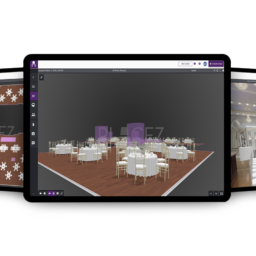Event management and hosting events is a vibrant, exciting landscape, but the heart and soul
of any memorable gathering often comes down to the choice of venue. For new event venue
owners entering this thriving industry, carving out a niche for your space and ensuring its
success requires a combination of vision, practicality, and a deep understanding of your
potential clientele. This comprehensive guide will walk you through the essential steps to open a
successful event venue, from the initial concept to the grand opening and ongoing operations.
Step 1: Define Your Unique Selling Proposition (USP)
The success of your event venue hinges on what sets it apart in a crowded marketplace. Your
Unique Selling Proposition (USP) is the distinctive factor that differentiates your venue from
others and draws in your ideal clients.
Identifying Your Target Audience
Before you can define your USP, knowing who you’re targeting is vital. Research the
demographics and preferences of your potential clients. Are you focusing on corporate clients,
wedding parties, or community events? Understanding these dynamics will shape your venue’s
features and marketing efforts.
Crafting Your Brand Story
Your USP should be integrated into your venue’s brand story. Are you an eco-friendly space?
Do you offer cutting-edge technology for presentations? Or do you have an exquisite backdrop
that’s perfect for photography? Whatever it is, your brand story should reflect the values and
needs of your target audience.
Step 2: Location, Design, and Amenities
Your venue’s physical location and the design of its space are critical factors in its success.
They should align with your USP and the needs of your audience.
Choosing the Right Location
Location can make or break a venue. Factors to consider include accessibility, local interest and
support, and the competitive landscape. A balance of visibility and convenience is ideal; you
want to be easy to find and located within your target market’s attention.
Tailoring the Design to Your Brand
Your venue’s design should support your USP. Whether it’s a modern, minimalist aesthetic for
tech-based events or a warm, historical charm for weddings, the design of your space is a
crucial part of the guest experience. Ensure the layout is versatile enough to host a variety of
event types without losing its core identity.
The Role of Amenities
The amenities in your venue can be a significant draw for clients. From stage lighting and
audiovisual systems to on-site catering and parking facilities, each amenity should be a
thoughtful addition that enhances the event experience you offer.
Step 3: Regulations and Legalities
Event venues come with a host of rules and regulations. Navigating these early ensures a
smooth operation down the line.
Zoning and Permits
Zoning laws can restrict the types of events you can host in your venue. Understanding these
laws and obtaining the necessary permits early will prevent surprise restrictions that could
jeopardize events.
Health and Safety Compliance
You’re responsible for the health and safety of everyone on your premises. Regularly review and
update safety protocols, and ensure you comply with fire codes and accessibility laws.
Licensing and Insurance
Proper licensing for alcohol, music, and other activities is vital. Equally important is securing
comprehensive insurance to protect against potential liabilities from hosting events in your
space.
Step 4: Marketing and Sales
Once your space is designed and compliant, the next step is to attract clients.
Building Brand Awareness
Develop a marketing plan that builds awareness around your venue. This might involve a mix of
online marketing, such as a polished website, active social media presence, and offline efforts,
like partnerships with local event planners or participating in venue showcases.
Creating Sales Strategies
For sales, develop a clear pricing strategy that reflects the value of your space. Consider
introductory rates to entice new customers and create package deals that simplify the planning
process for clients.
Providing Exceptional Customer Service
Exceptional customer service can be a powerful marketing tool. Offer site visits, be flexible with
client requests, and provide support throughout the planning process to ensure a positive
impression that leads to repeat business and referrals.
Step 5: Staffing and Operations
A well-trained and motivated team is indispensable to the success of any event venue.
Building the Right Team
Hire staff that aligns with your brand values and customer service goals. Each team member,
from event managers to maintenance crew, should contribute to a smooth operation and an
exceptional client experience.
Training and Development
Invest in training and development programs to ensure staff are equipped to handle the diverse
needs of events. Cross-training can be especially beneficial, as it allows staff to step in where
needed, maintaining a high level of service at all times.
Fine-Tuning Operations
Test your operations by hosting mock events or soft openings. This will reveal operational
challenges and allow you to adjust before the grand opening.
Step 6: Tech, Data, and Innovation
In a digital world, technology and data are invaluable assets for streamlining operations and
providing a cutting-edge customer experience.
Event Management Software
Employ event management software to simplify the booking process, manage client
relationships, and handle logistical details. This not only saves time but also ensures accuracy
and helps to avoid errors that can be costly to rectify.
Utilizing Customer Data
Gather data on customer preferences to tailor future offerings and enhance guest satisfaction.
Whether through post-event surveys or analyzing booking trends, customer data can help you
stay ahead of the curve.
Innovating for the Future
Keep an eye on emerging industry trends and technologies. Innovation can give your venue a
unique advantage and solidify your position as a leader in the events community.
Step 7: Continuous Feedback and Improvement
The grand opening isn’t the end of the road—it’s the beginning. Consistent feedback and
improvement are critical for long-term success.
Solicit Client Feedback
Actively seek feedback from clients after every event. Use this information to make incremental
improvements to the venue, your services, and the overall event experience.
Stay Competitive
Regularly assess your competition to stay aware of industry shifts and new offerings. This will
help you continue refining your own offerings to stay competitive.
Adapting and Growing
Be ready to adapt and grow with the needs of your clients and the industry. This might mean
expanding your venue space, adding new amenities, or adjusting your marketing and sales
strategies.
Opening a successful event venue is a labor of love that requires attention to detail, the ability to
adapt, and a commitment to providing unforgettable experiences. By following these essential
steps, you’re well on your way to carving out a distinctive place in the world of event hosting.
Remember, the success of your venue is as much about the events you host as it is about the
memories you help create. Now, go forth and create!















